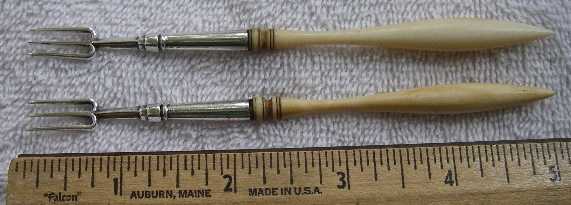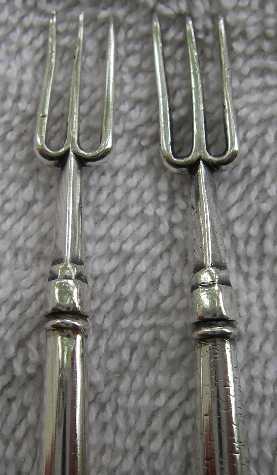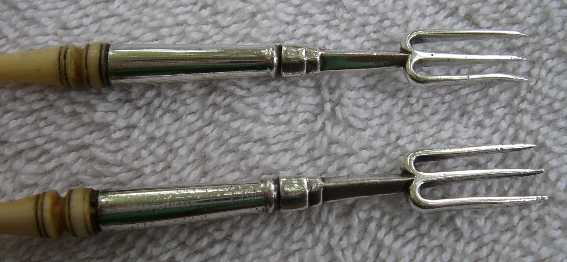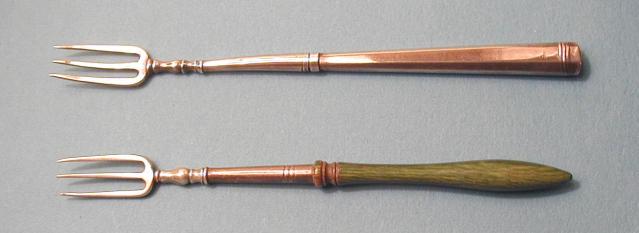|
|
|
| How to Post Photos |
REGISTER (click here)
|
|
|
|
| How to Post Photos |
REGISTER (click here)
|

|
 SMP Silver Salon Forums SMP Silver Salon Forums
  Continental / International Silver Continental / International Silver
  Tiny Ivory Handle Forks Tiny Ivory Handle Forks
|
| next newest topic | next oldest topic |
| Author | Topic: Tiny Ivory Handle Forks |
|
Brent Posts: 1507 |
  
    Hello all, Here is a nice pair of tiny silver forks with turned ivory handles. They measure 5 3/16" long, and the trident-like tines are just 5/8" long. They are well worn and have a nice patina, but I'm not quite sure how old they really are, or their intended use. Does anyone know? They could certainly be used for just about anything these days. Brent IP: Logged |
|
agphile Posts: 798 |
  
 Similar forks were being made in England at the end of the 18th century. They are normally described as pickle forks and sometimes as sweetmeat forks but I do not know of evidence for their precise use. The silver handled example in my photo has a maker's mark only for Joseph Taylor of Birmingham. The one with a green stained handle is unmarked as have been most examples I have seen which makes me think they were most common in the 1780s, i.e. before more stringent marking requirements accompanied the imposition of duty. IP: Logged |
|
blakstone Posts: 493 |
  
I catalogued a set of six of these sometime back which had ebonized wood handles and French provincial marks of 1798-1809, so I can confirm the date. I called them oyster forks, as I remember, but like agphile, I have no documentary evidence for this moniker. (The case, BTW, was clearly of later date.) IP: Logged |
|
Brent Posts: 1507 |
  
Thank you both for your input; I appreciate it! If asked I would have guessed late 18th early 19th C, so my intial instincts seems to have been correct. Thanks again, Brent IP: Logged |
|
ahwt Posts: 2334 |
  
Does anyone know why the usual color used for staining bone or ivory was green? IP: Logged |
|
bascall Posts: 1629 |
  
It's hard to say without a better look, but Brent's forks almost look like bone. Unless it's just my imagination, they have a little more grain than ivory . Ivory develops a brown colored staining as it ages. I don't know about green for ivory or bone. I'll have to take your word for that. IP: Logged |
|
agphile Posts: 798 |
  
ahwt Interesting question. We need an expert on dyes avilable in the 18th century. It may just have been fashion but I imagine there were limitations on what colours could be easily used and would last. IP: Logged |
|
bascall Posts: 1629 |
  
Yes, I did misunderstand the question. I'm very sorry. I didn't realize green was a common color for staining ivory. It's always good to learn something new even if it is the hard way. That is a good question though. IP: Logged |
|
Brent Posts: 1507 |
  
Hi all, The handles on my forks are definitely ivory; the pictures don't make it clear enough, but the characteristic ivory grain is there. As for yellowing with age, I have a feeling that that depends more on use and storage than anything else. Some old ivory gets very yellow, while other pieces seem to stay quite white. Brent IP: Logged |
|
FWG Posts: 845 |
  
Sunlight will darken ivory, as well consistent exposure to lemon juice (a trick for creating a false patina, for both scrupulous and unscrupulous reasons - and over-exposure will de-mineralize the ivory, leaving it soft). Rubbing with red palm oil produces the distinctive dark color of older African ivories. A tea bath will also darken ivory, although I don't think the color is as consistent with that. Basically, ivory is tooth, so what affects our teeth will similarly affect ivory. Personally I've also wondered about the green color, particularly since it's so often the same vivid green often used on shagreen. But I've never seen an explanation for it. Old home formularies have recipes for dying ivory many colors, but that bright green was certainly widespread, at least in the 18th-19th centuries in the European context. I've also seen occasional reference that dyed ivory took a higher polish, or became harder - depending on the process, certainly possible. But I don't think that can account for the green. IP: Logged |
|
agphile Posts: 798 |
  
A further thought. Back in Jane Austen's day blue was a very fashionable colour for gentlemen's coats simply because the blue dye was expensive. Humbler folk had to make do with brown. Might the green stain for ivory simply have been expensive and therefore desirable for those who liked to consume conspicuously? IP: Logged |
|
bascall Posts: 1629 |
  
An interesting aside maybe, the Ivory Coast was once also known as the Tooth Coast. IP: Logged |
All times are ET | next newest topic | next oldest topic |
  |
|
Ultimate Bulletin Board 5.46a
|
1. Public Silver Forums (open Free membership) - anyone with a valid e-mail address may register. Once you have received your Silver Salon Forum password, and then if you abide by the Silver Salon Forum Guidelines, you may start a thread or post a reply in the New Members' Forum. New Members who show a continued willingness to participate, to completely read and abide by the Guidelines will be allowed to post to the Member Public Forums. 2. Private Silver Salon Forums (invitational or $ donation membership) - The Private Silver Salon Forums require registration and special authorization to view, search, start a thread or to post a reply. Special authorization can be obtained in one of several ways: by Invitation; Annual $ Donation; or via Special Limited Membership. For more details click here (under development). 3. Administrative/Special Private Forums (special membership required) - These forums are reserved for special subjects or administrative discussion. These forums are not open to the public and require special authorization to view or post. |
|
copyright © 1993 - 2022
SM Publications
All Rights Reserved. Legal & Privacy Notices |